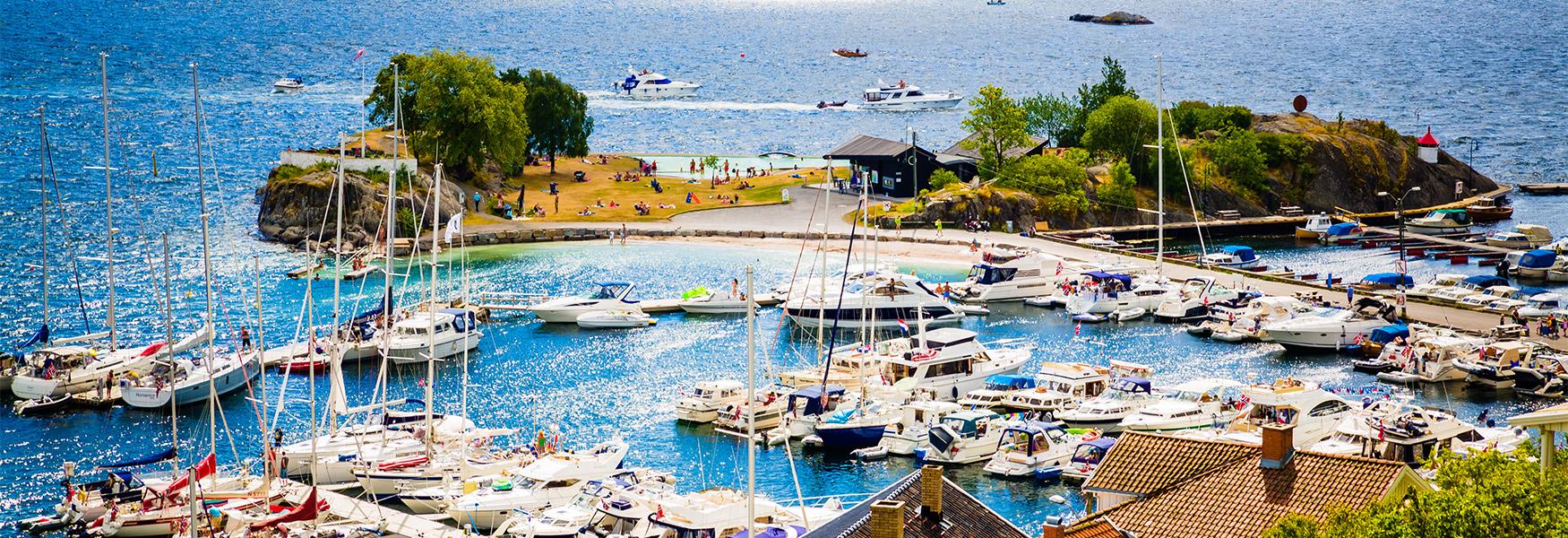




Gunnarsholmen Fortress / Bathing spot
Number of results: 20
Berg-Kragerø Museum promotes art, history, holiday life, coastal culture and export of natural ice in Kragerø - Make sure you explore our Edvard Munch exhibition.
Kragerø
Blooming of the anemones are mostly everywhere in Southern Norway at spring time. But on the island Jomfruland outside Kragerø, people go solely to contemplate the long white carpet that covers the 9 km long island in May.
Jomfruland
Gea Norvegica Geo Park is Scandinavia's first UNESCO certified geopark.
The geopark is located in the Vestfold and Telemark county, and is including municipalities of Bamble, Kragerø, Lardal, Larvik, Nome, Porsgrunn, Siljan og Skien.
Kragerø
Gunnarsholmen is located a just short walk from the town center and was originally an old coastal fort which protected Kragerø in the 18th and 19th century when warships and pirates threatened the city. Today it is an open area with a nice sand…
Kragerø
Kil together with Sannidal, are the oldest urban settlements in Kragerø municipality. A stroll through the narrow streets among the many restored and cozy houses where atmosphere from bygone days are still present is a real must.
Kragerø
Kragerø church was consecrated in 1870 and is a Gothic Revival church designed by Georg Andreas Bull and built in brick. The church replaced the old Christi church from 1652 which was a cruciform wooden church.
Kragerø
The Kragerø city centre is an exciting mix of cafes, shops, galleries and restaurants. Here you will find unique shops specializing in everything from shoes and bags to interior design and art.
Kragerø
Krikken Coastal Fort, a German construction from World War 2 is well worth visiting. The fort is located at Skåtøy island outside of Kragerø, and is an excellent hiking area wth beautiful surroundings and a very intersting history.
Skåtøy
The two lighthouses located in the middle of Jomfruland are well-known landmarks. The oldest of them is from 1839. You can get a fantastic panorama view over the other islands and the open sea from its top.
Jomfruland
is a local historic collection of buildings. Since 1949, eight buildings from 1700 and 1800s have been placed here: Millhouse, granary, storehouse,living room, farmhouse... . Experience this place by a guided tour?
Sannidal
Sannidal Church is a cruciform church built in 1711. Sannidal originaly had its own stave church from approx. year 1200. Different items from the stave church can be found at todays church.
Sannidal
In memory of Anton Martin Schweigaard, a Norwegian jurist and economic reformer who was born in Kragerø in 1808.
Kragerø
Steinmann is a viewpoint just above downtown with great views over the city. Well worth a visit.
Kragerø
Støle Church is a charming little wooden church from 1892. It is located on the old coastal road between Kragerø and Risør, 15 minutes drive from central Kragerø by ferry and car, or 20 minutes by car from the E-18 in Sannidal.
Kragerø
Strømtangen fyr is one of three lighthouses in Kragerø and lies between Rapen and Skjørsvik. The other two lighthouses are Jomfruland and Stavseng.
Kragerø
This idyllic forest lake at Jomfruland is where Theodor Kittelsen got inspiration for his painting "Nøkken" (water troll). The lake has been restored, and the trails are now accessible for wheelchair users.
Jomfruland
Kragerø is referred to as "The gem among coastal cities" of Edvard Munch, Norway's most famous artist of all time.
Kragerø
Welcome to Theodor Kittelsen’s childhood home.
Kragerø
Minneparken (The Memorial Park) is located right beside Kragerø Church. There you find a memorial stone for those who lost their lives during World War II.
Kragerø
Veten is Øyas magnificent viewpoint. From here you have the opportunity to experience impressive prospect of the downtown core and parts of our unique archipelago.
Kragerø